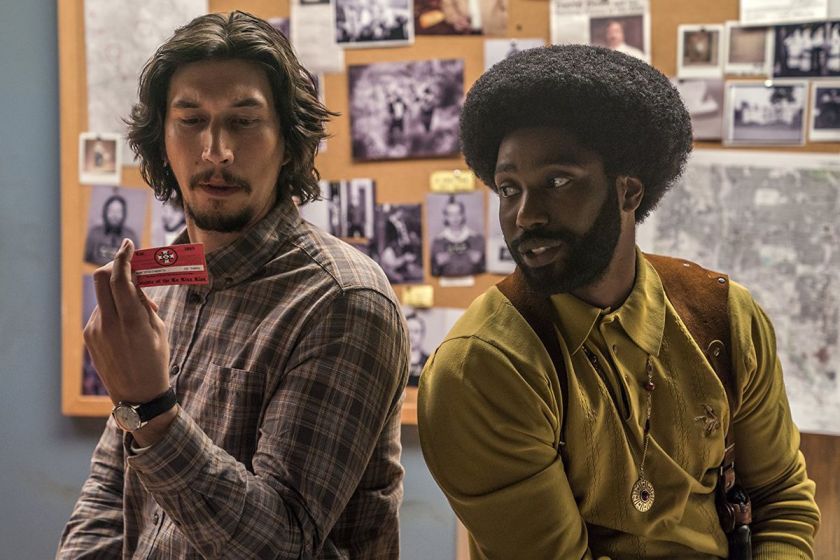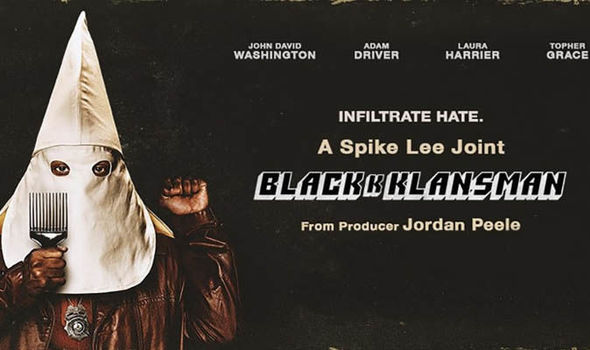Black KkKlansman (2018)
With the release of Black KkKlansman, Spike Lee once again steps into his rightful place as a maker of bluntly provocative (and, incidentally, hilarious) films about race in America. The film follows the true story of Ron Stallworth (John David Washington), one of the first black police officers in Colorado Springs. Apparently on whim, Stallworth calls an advertised number for information on the KKK, posing as a white supremacist, and strikes up a rapport with the local chapter president Walter Breachway (Ryan Eggold). Stallworth eventually infiltrates the local chapter with the help of his sergeant and white detective Flip Zimmerman (Adam Driver), who acts as Stallworth in face to face meetings, eventually working his way all the way up to conversations with David Duke (Topher Grace) himself.
As with this year’s Sorry to Bother You, Black KkKlansman is very much about the nature of voice and the formation of identity out of voice. Ron speaks for himself – or rather, the white man he’s pretending to be – over the phone, while Flip has to speak for him in person. In one telling exchange, Ron and the police chief argue over Flip’s ability to sound like him, the chief implying that Ron’s voice must be far different from Flip’s simply because of his race. “Some speak the King’s English, some speak jive, and I happen to be fluent in both,” says Ron. But as a character, he’s not entirely comfortable in either milieu – he has difficulty matching the proper rhetoric in an initial meeting with a black student organization, and he ultimately has to teach Flip to sound more like him. The layers are multitudinous – Ron is performing as a white man, but he’s using his own voice; Flip, a white man, has to sound like a black man speaking “white.” Those separations of identity and how voice and identity coalesce is fundamental to the film – David Duke (Topher Grace) claims that he can tell simply by someone’s speech whether they are black or white. Ron is both cop and black man; not a “pig,” as his girlfriend Patrice (Laura Harrier) claims, but a cop, and also uncomfortable in his treatment at the hands of other white cops. Flip’s identity, in turn, is split between performing as Ron with the KKK, a world where he’s treated as a friend and brother, his identity as a Jewish man (which, until the job, he claims never formed much of an identity), and his personal, apparently non-racist beliefs.
Black KkKlansman situates itself where the real story occurred – in 1970s Colorado Springs. So often stories about racism in America occur either in inner cities or in the deep South; here, to a 2018 audience, we have a story in the “real America” of the Midwest, in a relatively safe liberal enclave, in which the KKK are the smiling next door neighbors. This is most clearly emphasized in the form of Connie Kendrickson (Ashlie Atkinson), the wife of a KKK member and a Midwest homemaker who becomes instrumental in the film’s final act. The result speaks clearly to white liberal America, that the people beneath the hoods are not others in some distant or backward past, but our friendly, innocuous neighbors.
Lee employs a blunt arc under which he conceals layers of characterization and complexity, drawing very clear parallels between the 1970s narrative and America in 2018. And the references he makes are not ahistorical – “America First” was indeed a rallying cry of white supremacists, and it has also been employed by Trump. David Duke himself has been a recent feature in American politics, endorsing Trump’s candidacy and speaking openly about the rise of white supremacy during the Nazi march in Charlottesville. The parallels between the contemporary moment and the events of the film are made explicit – a chilling speech by Ron’s sergeant hammers this home – but more than that, this is about the development of white supremacy in America. Posters of Richard Nixon are on the walls of a clubhouse during a KKK rally, a brief reminder that Nixon was the one to institute the “Southern strategy” and solidly identifying the formation of the modern GOP with support from white supremacists. David Duke wanted to make the KKK a viable political entity, and has done just that, normalizing that which should be abhorrent.
As with many of Lee’s works, media is as culpable in its representation of race as people themselves. The movie opens with a sweeping Technicolor shot as a Confederate flag waves above fallen soldiers, and a pivotal scene includes the KKK chapter watching, and cheering on, Birth of a Nation, a film credited with giving new life to the KKK. David Duke references Gone with the Wind as support for his beliefs, and Ron and Patrice discuss the depiction of black people as cops and pimps in films like Shaft and Superfly. Blaxsploitation references abound in camera techniques and music. The importance of cinema and how it represents race and reinforces or comments on racial prejudice runs throughout the film, reminding us that film does indeed have power to reignite racial hatreds, and provide inspiration for revolution. Lee is giving his audience a film history lesson in American racism, in white supremacy and racial conflict, in the Black Panthers, and in the responsibility of media itself in the portrayal of both black people and the KKK.
Black KkKlansman speaks to people who already agree with its central point, which is both its strength and its weakness. It plays like a call to arms, to stand up against racism not in the abstract past but in the here and now, by emphasizing just how dangerous the KKK truly are. The white police officers and even Ron himself initially downplay the danger the KKK poses – Flip dismisses them at first as grandstanders, hicks with nothing better to do. But as the film proceeds, we see the reality of the “organization,” in the charismatic and horrifying presence of David Duke, in the KKK’s willingness to use violence and intimidation to achieve their ends, and in their complexities of racial biases, theories, and hatreds. “They aren’t The Beverly Hillbillies,” says Flip after his first meeting with the local Klan. The film runs the gamut, showing us both the stupid “hicks” and the charming, “respectable” men like Duke and the country club set. It even establishes some Klan members as apparently “normal” men, all of them with regular jobs, some of them military. The film represents the KKK as being more than just a bunch rednecks playing dress-up. They are a group of people hysterically dedicated to subjugating and then eradicating everyone they deem of a “lesser race” (here, the film avoids making this a solely black/white issue, and spends some time on depicting the Klan’s hatred of pretty much everyone not of white European descent).
Lee employs all of his considerable skill and filmmaking prowess, developing a narrative that is at once blunt and nuanced, horrifying and funny in the most unexpected ways. It shows the soul-eating nature of racism without asking us to sympathize with racists. There’s little joy to be found among the members of the Klan, all of whom seem to spend most of their free time talking about how much they hate everyone else. But Black KkKlansman pulls no punches, at one point cutting between a Klan inauguration celebration and the black student union listening to a talk by an elderly man who witnessed a friend mutilated, lynched, and burned. The images of the lynching are juxtaposed with the seething hatred of the Klan in its faux Christian pomp and circumstance, bringing home the reality of violence, the reality of hatred, the deep-seated racial divisions at the heart of America. It reminds us that, for all that they might seem ridiculous, the Klan is real and powerful and violent, a true danger, a true force for evil. And beneath those hoods are men and women that we stand next to in the grocery store, and that now sit in the White House.
Black KkKlansman opens nationwide today.

One thought on “Black KkKlansman (2018)”